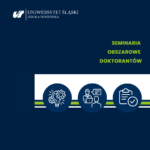Education curriculum
When commencing education, the doctoral student must familiarize with the applicable curriculum in detail.
Education program for doctoral students admitted to the Doctoral School for the academic year 2019/2020
Education program for doctoral students admitted to the Doctoral School for the academic year 2020/2021, 2021/2022 and 2022/2023
Education program for doctoral students admitted to the Doctoral School for the academic year 2023/2024
The cycle of education at the Doctoral School
Education at the Doctoral School is individualized. Doctoral students choose classes in accordance with the curriculum assigned to them. They decide independently about the choice of tutors and optional classes and the duration of some classes (the latter does not apply to the 2019/2020 program). They fit their needs into a four-year education cycle, consisting of the “milestones” described below.
By the end of the first year
- application for the appointment of a supervisor (supervisors/supervisor and auxiliary supervisor) up to 3 months from the start of education – details
- implementation of classes required by the educational program
- preparation and submission of an Individual Research Plan – details
- the possibility of joining a joint education program with foreign partners (see: Uniwersytet Sapienza w Rzymie)
Mid-term evaluation after the second year of education
- implementation of classes required by the educational program
- submitting a grant application
- presentation of the project to the scientific council of the institute and assessment by the evaluation committee – details
Until the end of the third year of education
- foreign scientific internship or participation in a foreign scientific conference
Until the end of the fourth year of education
- implementation of classes provided for in the educational program
- implementation of three tutor cycles – details
- area seminar – details
- the possibility of extending the deadline for submitting the thesis under the conditions described in the SD Regulations
- submission of a doctoral dissertation – details
Individual aspects of education
In addition to classes organized by the Doctoral School, the doctoral student has tasks whose organization and planning lie on his side, in cooperation with the supervisor.
Doctoral seminar
The seminar is counted annually. The end of the fourth year of the seminar is based on the submission of a doctoral dissertation.

Submission of an application for financing from external sources (grant)
PhD students who are provided with total funds for research (for example, as participants in grants) and who demonstrate experience in fundraising may be exempt from this obligation.
The doctoral student in the Individual Research Plan provides the type of grant and the deadline for applying.

Internationalization of research
The performance of this obligation is also assumed to be carried out by a query in a foreign institution and field or laboratory tests conducted abroad.
A doctoral student should secure funds for the trip, e.g. by obtaining funding (grants, NAWA mobilities, institutions supporting research, such as foundations or scientific societies, trip at the expense of the host institution) or by participating in one of the projects organized by the university (Erasmus+ program, PROM program internal DS competitions, other funds provided by the university).

Expert tutoring
Look: planning, description and formalities related to tutoring

Area seminar
The seminar is organized by doctoral students, with selected academic teachers’ support.
Look: rules of organization and schedule of seminars in a given academic year

Education Quality Assurance System
Education at the Doctoral School is conducted, monitored, and evaluated by the procedures of the Education Quality Assurance System, adopted by the Doctoral School Council on January 9, 2020.
Document content:
Procedures of the Education Quality Assurance System of DS UŚP (in polish)





